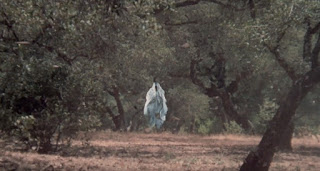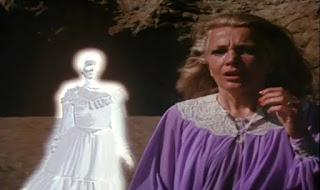THE GRAVEYARD SHIFT
(1973)
Dir - Don McDougall
Overall: GOOD
Executive producer/B-movie camp maverick William Castle finally appears on screen in a speaking role for his Ghost Story/Circle of Fear series after merely providing a Hitchcock-esque, blink and you'll miss it cameo in the show's first episode "The New House". "The Graveyard Shift" finds John Astin as a former actor who nonchalantly settles for a security gig at his old film studio stomping grounds after suffering a career-ending injury years earlier. Ghostly activity begins to take place as the due date for he and wife Patty Duke's first child approaches, and these scenes are handled with spooky haunted Halloween house flare by director Don McDougall. The reveal as to who the unwholesome specters are and what they are doing is absurd on paper, but as usual, the presentation never winks at the audience. Astin and Duke sell the meta-adjacent material and on that note, Castle's appearance as a studio head actually serves as the exposition tipping point to wrap everything up. The finale is anticlimactic, but that is the only fault that can be found in an otherwise clever and properly atmospheric bit of small screen ghoulishness.
SPARE PARTS
(1973)
Dir - Charles Dubin
Overall: MEH
Jimmy Sangster and Seeleg Lester collaborated, (or both worked on the same script separately), for the first of two times on Circle of Fear with the odd possession tale "Spare Parts". A clever title considering that no, this does not have anything to do with automobiles. Instead, it concerns three different people who are given hand, eye, and vocal chord transplants from a lone donor, a donor with an unwholesome agenda from beyond the grave. Meg Foster makes her second appearance on the program here as the former blind lady, joined by Alex Rocco whose brand new voice is dubbed by Don Knight's bad guy. There is a fun comeuppance twist worthy of a Tales from the Crypt rug pull, and it has the usual continuous minor key musical accompaniment plus plenty of atmospheric ambience to spook up the scenes where Knight's ghostly visage appears to the people who have inherited his appendages. Susan Oliver sadly turns in a lousy performance as the targeted widow, and this follows the show's trajectory of unsatisfactory endings, but the unusual premise and set pieces are not without their merit.
THE GHOST OF POTTER'S FIELD
(1973)
Dir - Don McDougall
Overall: MEH
The second Ghost Story/Circle of Fear episode to feature doppelgängers, "The Ghost of Potter's Field" is one of the least successful of the series. This is not because it is egregious or ludicrous, (there are plenty of the latter installments that came before), it is just because things never pick up steam. Premise wise, the concept of a wronged-spirit taking the form of a random guy who happens upon his grave site and then targets that random guy is not one that is frequented much in supernatural fiction, but that may be because it is not that interesting. As our hapless protagonist, Tab Hunter spends most of the story as a stick in the mud who is prone to temper tantrums and while that is explained in Bill S. Ballinger's script, it still makes for a lousy guy to spend fifty minutes with. The plot follows a monotonous structure where Hunter's malevolent twin arbitrarily appears to cause him misfortune, including murdering or near-murdering several acquaintances of his. Competent yet bland and with no spooky set pieces, it all leads to a finale where in this universe, a ghost can simply be shown a photograph of their former selves and given a speech in order to go away.
THE PHANTOM OF HERALD SQUARE
(1973)
Dir - James H. Brown
Overall: GOOD
Coincidentally appearing as a man named James Barlow when he would face off against the immortal Kurt Barlow six years later in the Salem's Lot miniseries, David Soul dons a brown leather jacket and shows off his dreamy blonde hair in the final Circle of Fear episode "The Phantom of Herald Square". Thankfully, this is a strong one that has a heart-string-pulling finale and takes on some new subject matter, namely the lingering turmoil suffered by those who bargain with their souls and sign Faustian packs. Soul plays such a chap here, but James H. Brown's teleplay wisely only gingerly dishes out the information so that we are thrust right into such an uncanny scenario with no expository safety net. Granted this is hardly a tricky script to figure out, and viewers will do so long before Soul's hapless love interest Sheila Larken finally gets it all explained to her. Yet this works to the story's advantage, where well-versed genre fans will quickly be able to make connections that our likeable characters, (plus one no-nonsense supernatural bureaucrat portrayed by Murray Matheson), have to merely endure. There is nothing spooky or atmospheric going on here, but as a romantic Twilight Zone excursion, it resonates more than it has any business to.
(1973)
Dir - Don McDougall
Overall: GOOD
Executive producer/B-movie camp maverick William Castle finally appears on screen in a speaking role for his Ghost Story/Circle of Fear series after merely providing a Hitchcock-esque, blink and you'll miss it cameo in the show's first episode "The New House". "The Graveyard Shift" finds John Astin as a former actor who nonchalantly settles for a security gig at his old film studio stomping grounds after suffering a career-ending injury years earlier. Ghostly activity begins to take place as the due date for he and wife Patty Duke's first child approaches, and these scenes are handled with spooky haunted Halloween house flare by director Don McDougall. The reveal as to who the unwholesome specters are and what they are doing is absurd on paper, but as usual, the presentation never winks at the audience. Astin and Duke sell the meta-adjacent material and on that note, Castle's appearance as a studio head actually serves as the exposition tipping point to wrap everything up. The finale is anticlimactic, but that is the only fault that can be found in an otherwise clever and properly atmospheric bit of small screen ghoulishness.
SPARE PARTS
(1973)
Dir - Charles Dubin
Overall: MEH
Jimmy Sangster and Seeleg Lester collaborated, (or both worked on the same script separately), for the first of two times on Circle of Fear with the odd possession tale "Spare Parts". A clever title considering that no, this does not have anything to do with automobiles. Instead, it concerns three different people who are given hand, eye, and vocal chord transplants from a lone donor, a donor with an unwholesome agenda from beyond the grave. Meg Foster makes her second appearance on the program here as the former blind lady, joined by Alex Rocco whose brand new voice is dubbed by Don Knight's bad guy. There is a fun comeuppance twist worthy of a Tales from the Crypt rug pull, and it has the usual continuous minor key musical accompaniment plus plenty of atmospheric ambience to spook up the scenes where Knight's ghostly visage appears to the people who have inherited his appendages. Susan Oliver sadly turns in a lousy performance as the targeted widow, and this follows the show's trajectory of unsatisfactory endings, but the unusual premise and set pieces are not without their merit.
THE GHOST OF POTTER'S FIELD
(1973)
Dir - Don McDougall
Overall: MEH
The second Ghost Story/Circle of Fear episode to feature doppelgängers, "The Ghost of Potter's Field" is one of the least successful of the series. This is not because it is egregious or ludicrous, (there are plenty of the latter installments that came before), it is just because things never pick up steam. Premise wise, the concept of a wronged-spirit taking the form of a random guy who happens upon his grave site and then targets that random guy is not one that is frequented much in supernatural fiction, but that may be because it is not that interesting. As our hapless protagonist, Tab Hunter spends most of the story as a stick in the mud who is prone to temper tantrums and while that is explained in Bill S. Ballinger's script, it still makes for a lousy guy to spend fifty minutes with. The plot follows a monotonous structure where Hunter's malevolent twin arbitrarily appears to cause him misfortune, including murdering or near-murdering several acquaintances of his. Competent yet bland and with no spooky set pieces, it all leads to a finale where in this universe, a ghost can simply be shown a photograph of their former selves and given a speech in order to go away.
THE PHANTOM OF HERALD SQUARE
(1973)
Dir - James H. Brown
Overall: GOOD
Coincidentally appearing as a man named James Barlow when he would face off against the immortal Kurt Barlow six years later in the Salem's Lot miniseries, David Soul dons a brown leather jacket and shows off his dreamy blonde hair in the final Circle of Fear episode "The Phantom of Herald Square". Thankfully, this is a strong one that has a heart-string-pulling finale and takes on some new subject matter, namely the lingering turmoil suffered by those who bargain with their souls and sign Faustian packs. Soul plays such a chap here, but James H. Brown's teleplay wisely only gingerly dishes out the information so that we are thrust right into such an uncanny scenario with no expository safety net. Granted this is hardly a tricky script to figure out, and viewers will do so long before Soul's hapless love interest Sheila Larken finally gets it all explained to her. Yet this works to the story's advantage, where well-versed genre fans will quickly be able to make connections that our likeable characters, (plus one no-nonsense supernatural bureaucrat portrayed by Murray Matheson), have to merely endure. There is nothing spooky or atmospheric going on here, but as a romantic Twilight Zone excursion, it resonates more than it has any business to.






















